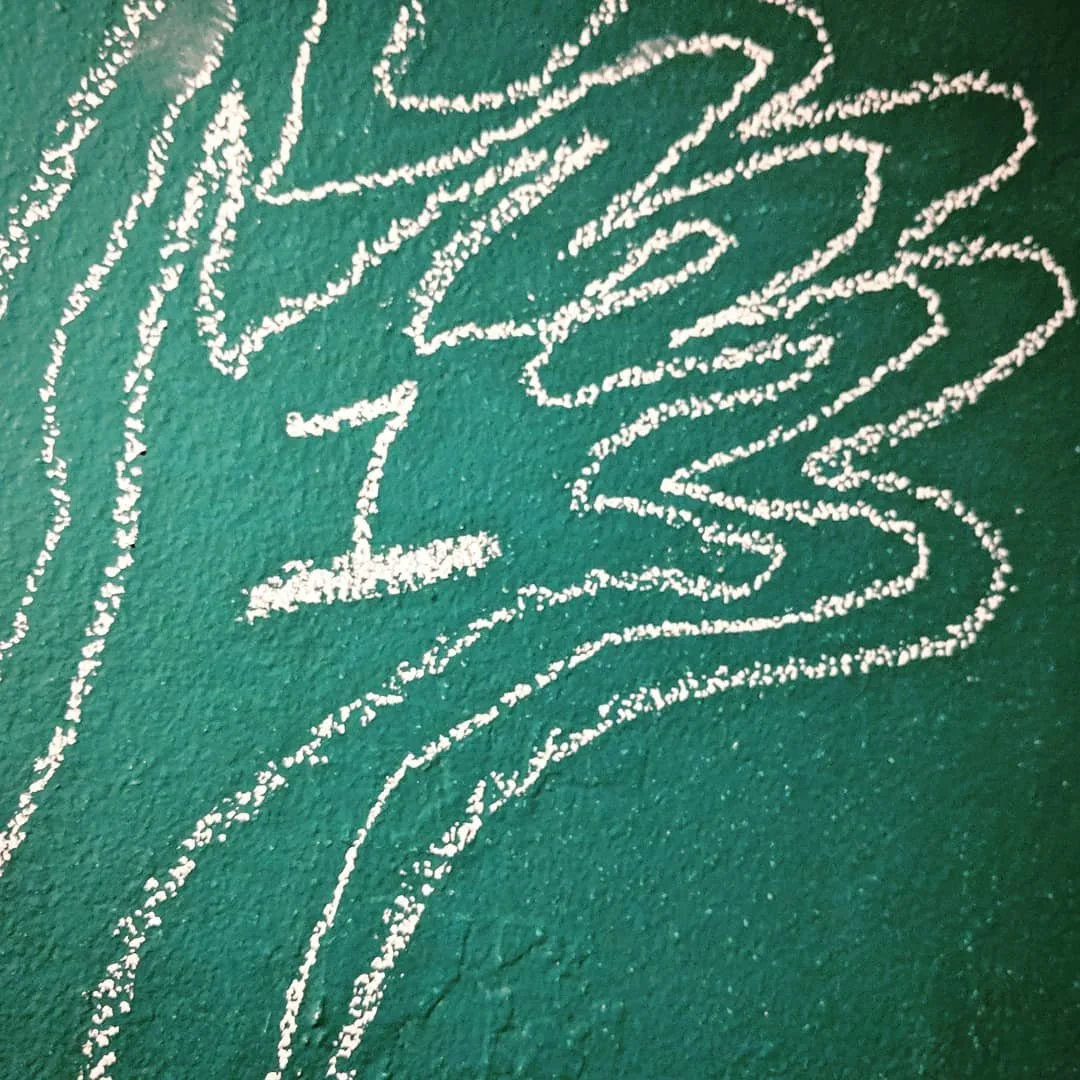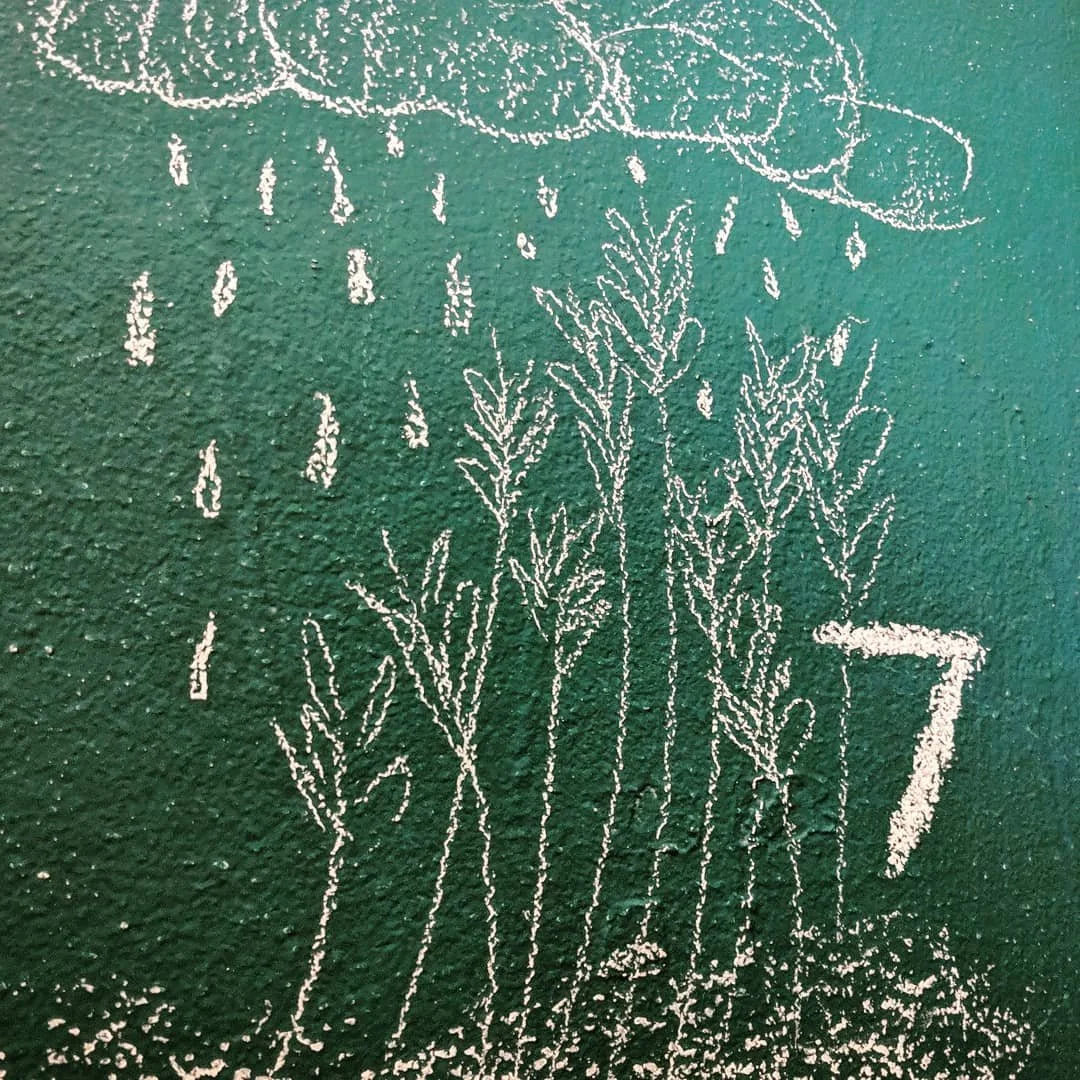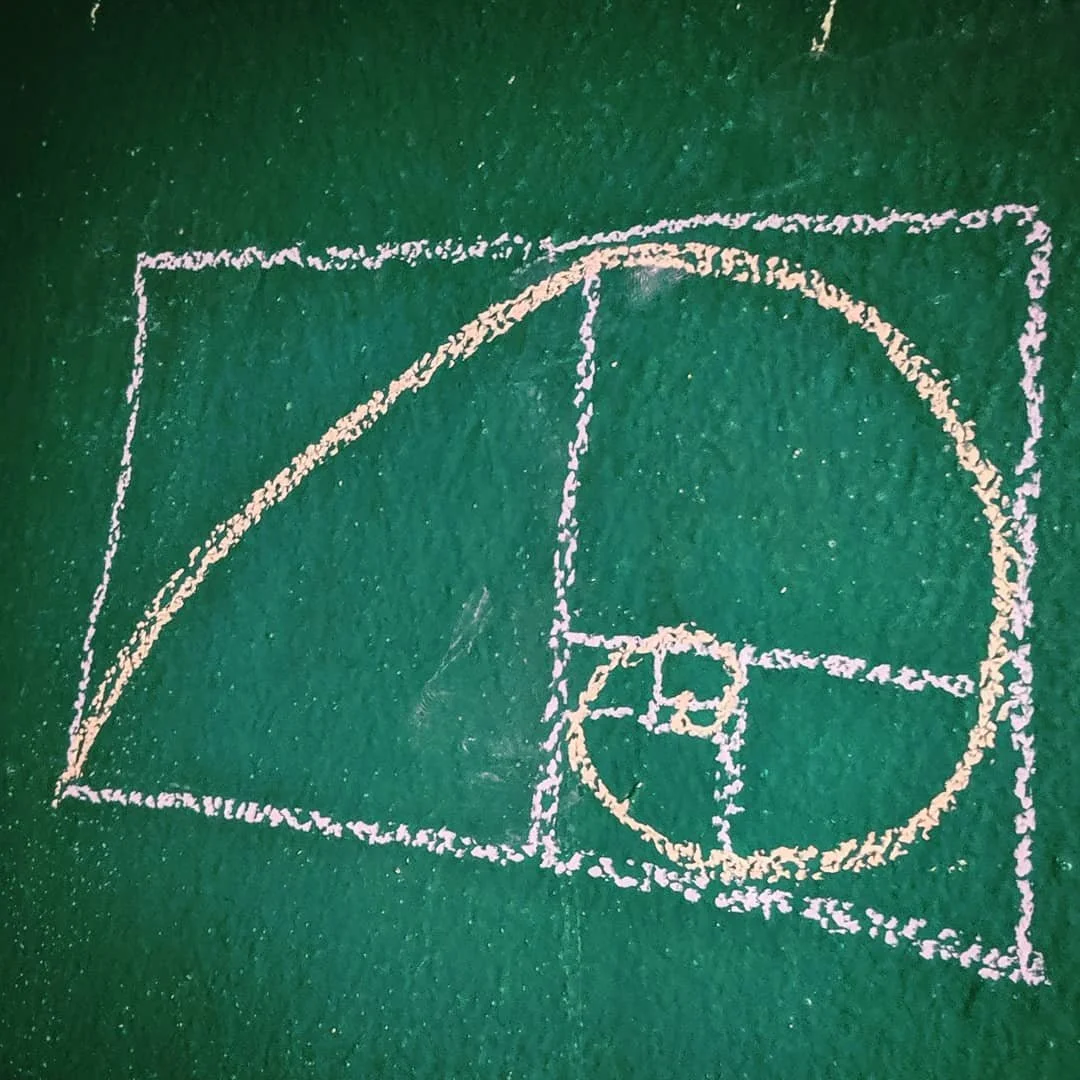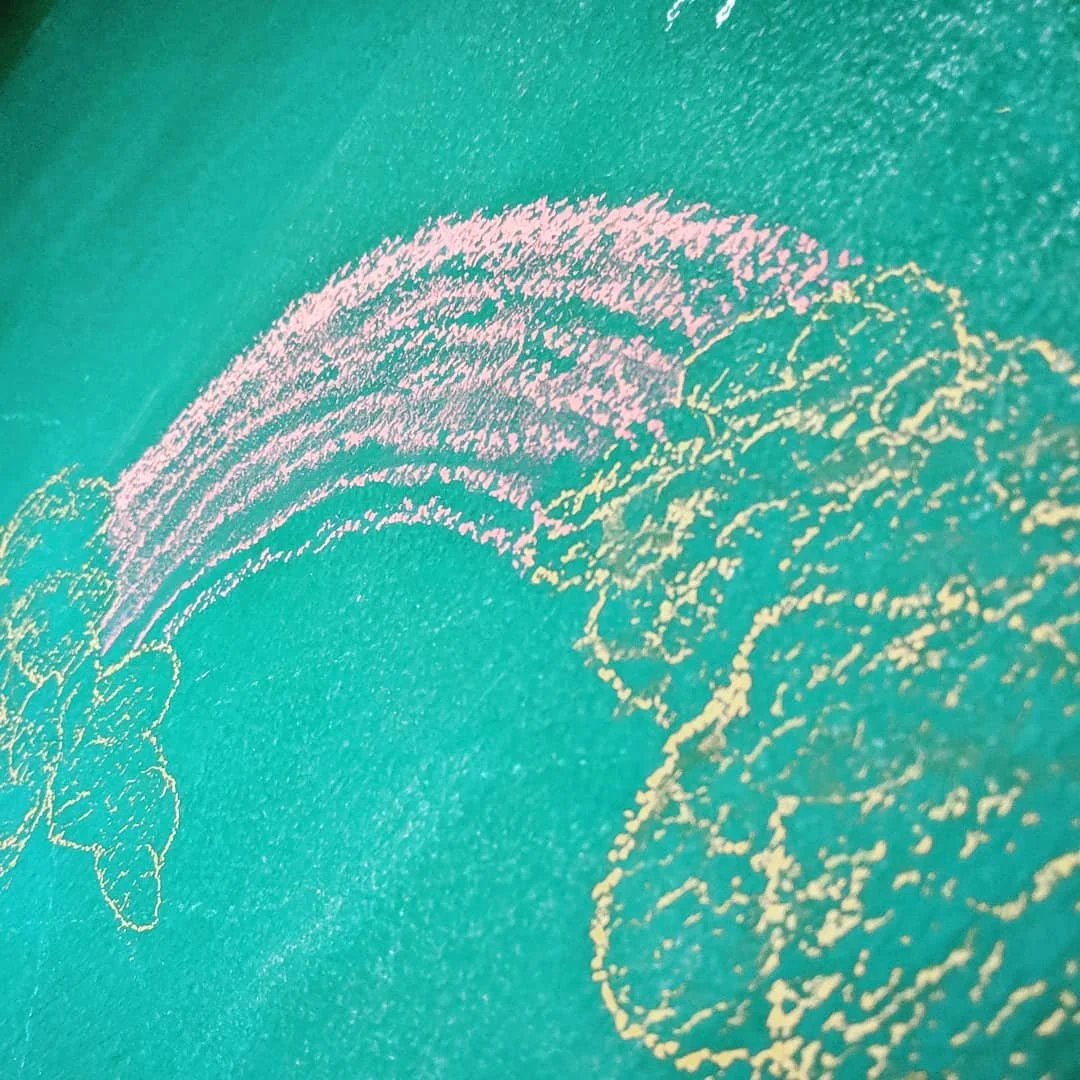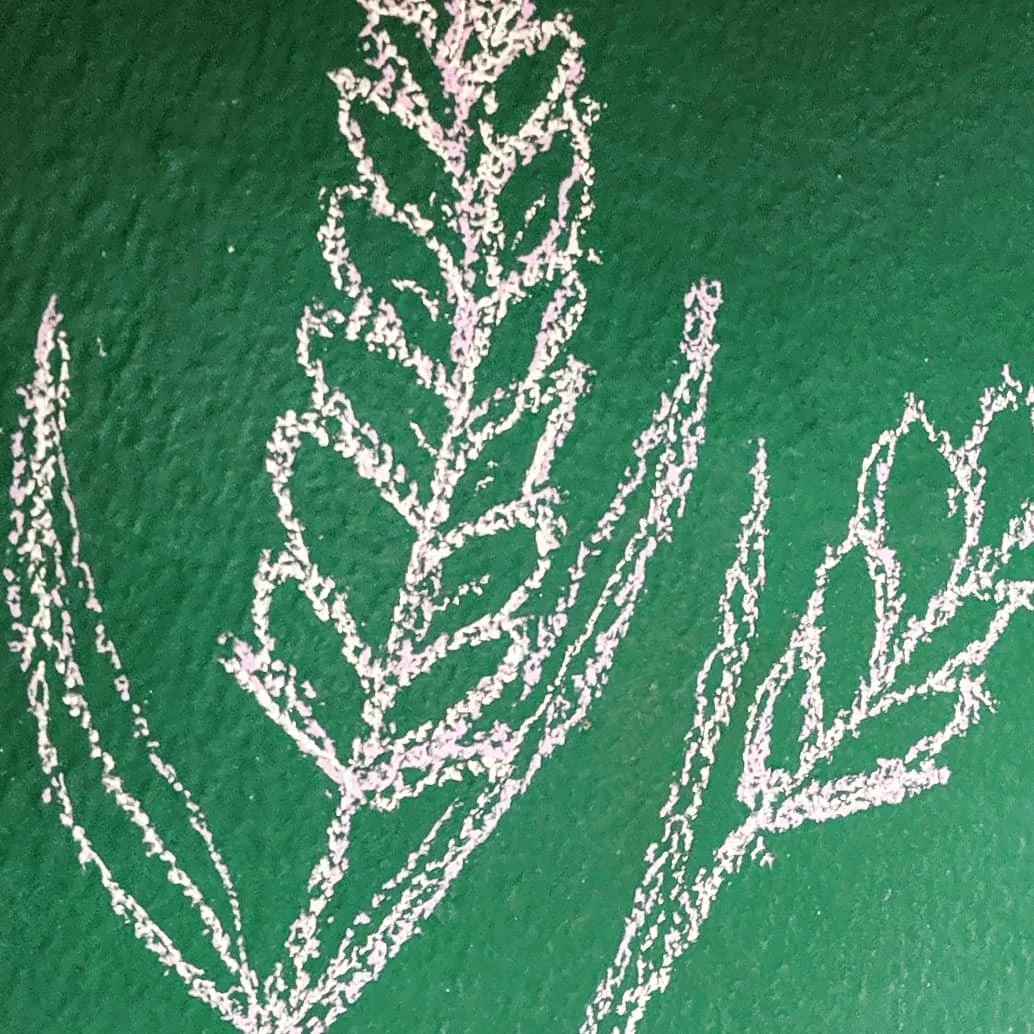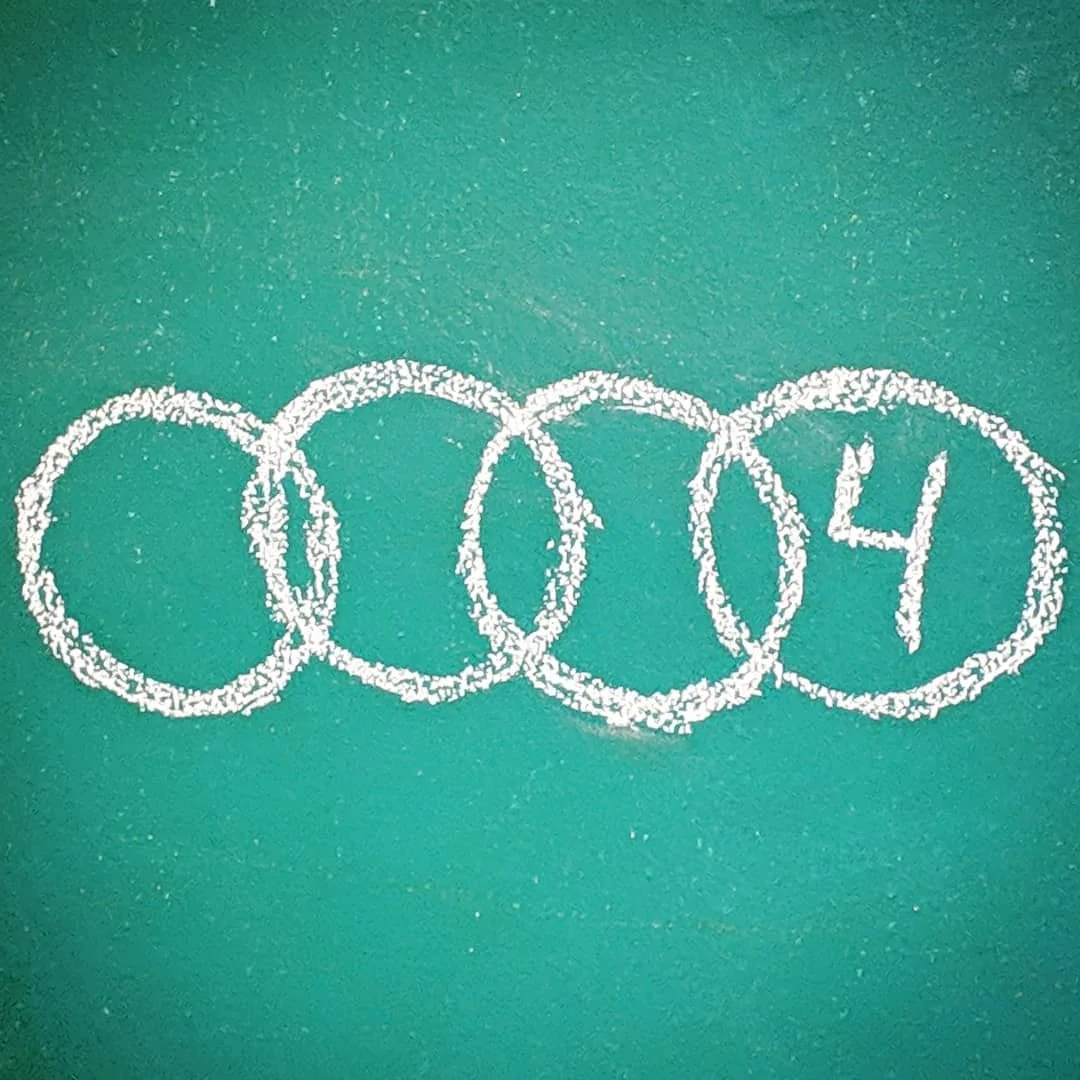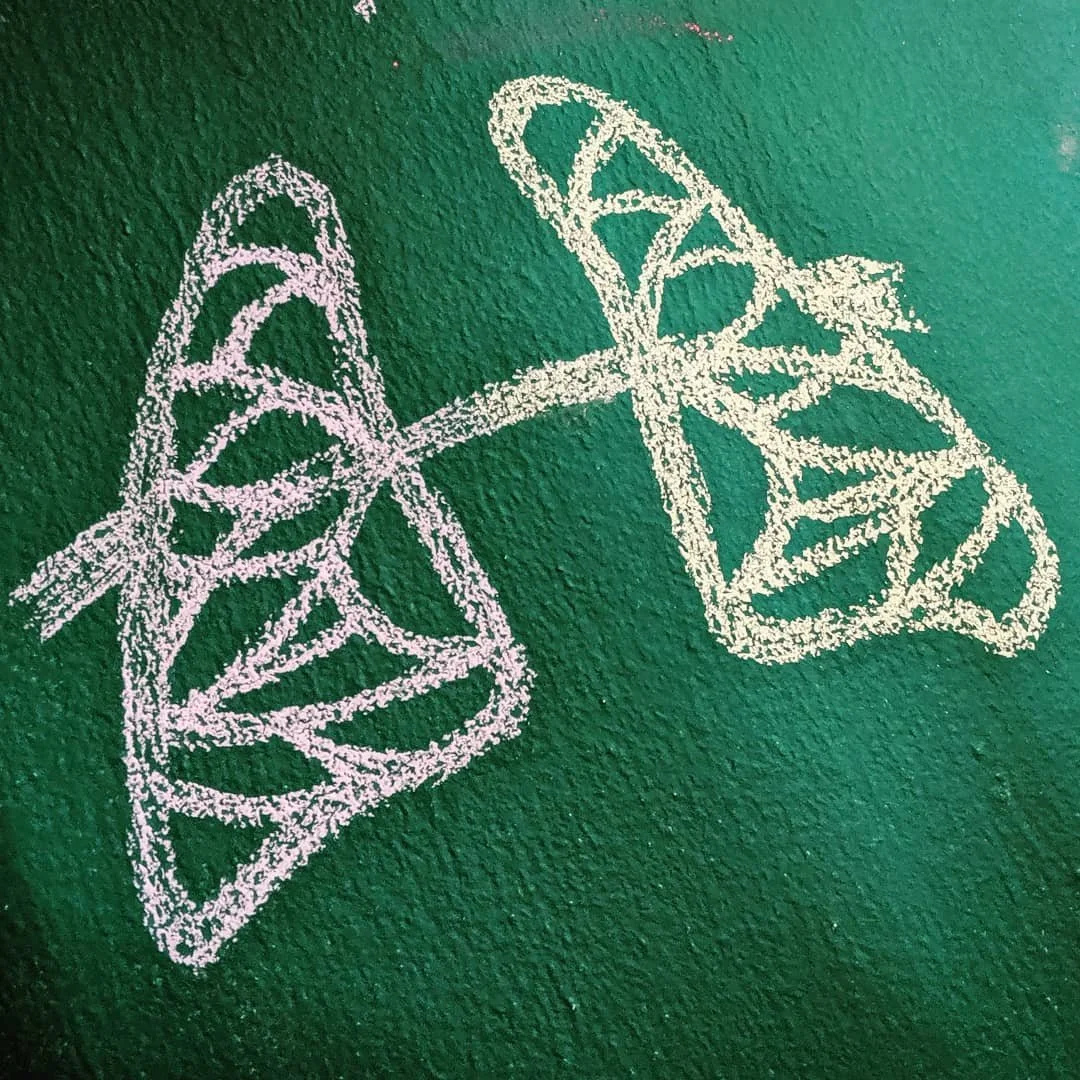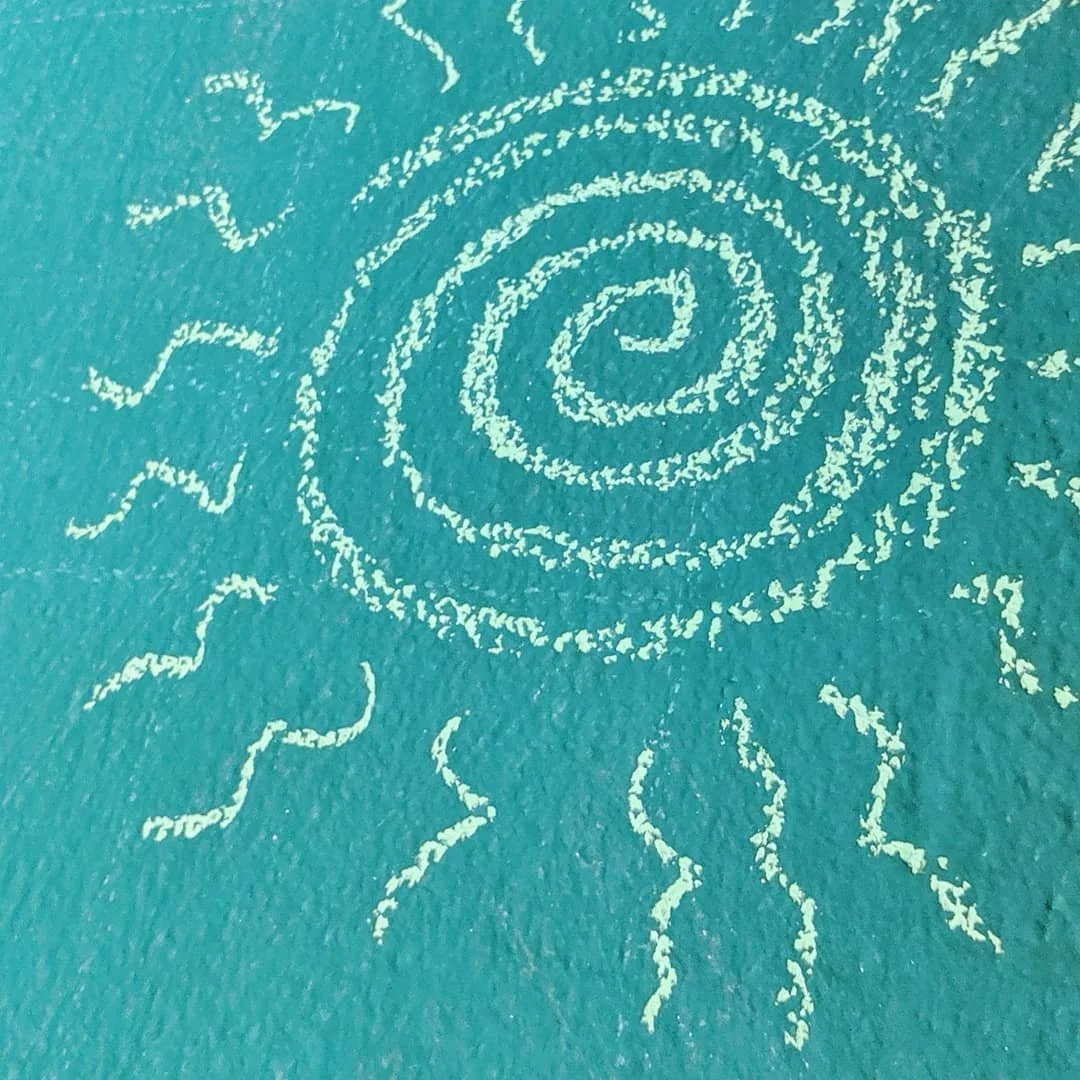Crafting the Omer
Chalk Wall Edition (2019)
1
3
5
19
Today is chesed in chesed, lovingkindness in lovingkindness, compassion in compassion. Such a fitting combination with oneness. This journey to Shavuot will show us the combination of self, other, and intersection--all which must be done from a place of chesed.
What is Hod within chesed, Splendid compassion?
Perhaps love at first sight, a first kiss, a one night stand?
7
We rectify tiferet with chesed-harmony with compassion.
Tiferet is the balance between judgement and mercy. What does it mean when tiferet is found within chesed? What is most striking of this sefirotic combination is not the inclusion of chesed, but the restraint of gevurah, of judgement. When we try to find a comprise, operating out of tiferet within chesed, means letting go of past grudges.
9
11
13
17
21
26
malchut or Shekhina within chesed: manifestations of lovingkindness.
מוריד הטל:
You are forever mighty, Yah, who rains dew upon us.
We contemplate the gevurah of gevurah, the justice of justice.
Our sacred text teaches us:
צדק צדק תרדוף
Justice justice you shall pursue
What is meant by the doubling of צדק?
The end does not justify the means...the pursuit of justice must also be done justly.
15
Representing the netzach of gevurah, the endurance of judgement, the victory of dissent.
The Reverend Dr Martin Luther King Jr. once said, “Let us realize the arc of the moral universe is long, but it bends toward justice.” Justice Ginsberg, long may she endure, long may she judge. May she fight for our victories, and give voice to our dissent.
We contemplate the yesod within gevurah, the foundation within justice. .
This is the Constitution (USA)
This is our Charter of Rights and Freedoms (Canada)
We appreciate the chesed of tiferet, the lovingkindness of compassion and beauty. Today I'm seeking to smile genuinely...not out of pity, duty, or trying to hide. Today my smiles came a place of love and compassion.
39
We contemplate Tiferet within Tiferet - Compassion radiating within Compassion. I learnt this song with my dear chevre at Livnot U'Lehibanot up in Tzfat. It's a simple ditty, a song of compassion within compassion, and it makes my soul smile.
Deep inside my heart I've got this everlasting light
It's shining like the sun
It radiates on everyone
And the more that I give
The more I've got to give
It's the way that I live
It's what I'm living for
24
28
Where Hod shines within Tiferet. Splendor and humility residing within compassion. We are commanded to give Tzedakah; When we give to our institutions, people are keen to have their names on buildings and ritual objects, but donating to the building's maintenance is far less sexy. Our ancestors all gave a half-shekel of silver which was transformed into curtain hooks! Hod in Tiferet is about giving with humility. The Rambam taught about 8 levels of tzedakah, the 2nd highest form is Hod in Tiferet, it's giving anonymously to an anonymous person.
30
33
41
We are awed by the Malchut of Tiferet, we are awed by the manifestations of majesty in beauty. Abraham Joshua Heschel wrote: Awe is more than an emotion; it is a way of understanding, insight into a meaning greater than ourselves. The beginning of awe is wonder, and the beginning of wisdom is awe. Awe is an intuition for the dignity of all things, a realization that things not only are what they are but also stand, however remotely, for something supreme. Awe is a sense for transcendence, for the reference everywhere to mystery beyond all things. It enables us to perceive in the world intimations of the divine, to sense in small things the beginning of infinite significance, to sense the ultimate in the common and the simple: to feel in the rush of the passing the stillness of the eternal. What we cannot comprehend by analysis, we become aware of in awe.
Today contemplate the tiferet within netzach, compassion and balance within endurence.
I feel so busy, how can I afford to give myself a break? But we all need to recharge of we are to stay strong. Sometimes we need to take a break in order to endure. We need to strike a balance and Shabbat is a representation of that balance. Will you allow yourself a break this Shabbat?
We contemplate hod within netzach, splendor and humility within endurance and victory.
Every worthwhile endeavour starts from a humble, yet splendorous seed. For it to grow and endure, it must be nurtured, protected, yet exposed.
What seeds of splendor are you planting? What victorious plants are you harvesting?
We contemplate malchut within netzach, or manifestations of dignity within endurance.
People don't choose to be refugees. In their stories we have seen their endurance, let us receive then with dignity
We strive for the gevurah within Hod, the judgement and strength with humility and splendor.
I went for a Shabbes walk in Central Park. On the path was a huge turtle, bigger than I had ever seen in the part. It was about 20 feet from the water. surrounded by a group of people, and visibly stressed. People were trying to lure it into the water while it just hissed and stood still. In that moment I wanted to tell people to back off, and leave it alone. It could find its own way home if it wasn't so frightened. But I hesitated, making judgement in my head why I should or shouldn't intervene. These internal judgments would determine how I enacted Hod. Hod could be saying nothing, Hod could be saying something, it all depends on the gevurah. I didn't end up saying anything, but wish I had the strength to have said something. But had I, would that have been an act of the ego?
We contemplate the Hod of Hod or the humility and splendor of humility and splendor. Talmud Bavli Chullin 89a teaches: I granted greatness to Abraham, yet he said before Me: “And I am but dust and ashes” (Genesis 18:27). I granted greatness to Moses and Aaron, yet Moses saidof the two of them: “And what are we” (Exodus 16:7). I granted greatness to David, yet he said: “But I am a worm, and no man”(Psalms 22:7). The Mussar Institute teaches us to affirm true humility or anavah as "No more than my place, no less than my space."
35
37
We contemplate the malchut of hod--manifestations and dignity of humility and splendor. This week has been particularly difficult--Hod is so hard to define! Trying to understand hod as both splendor and humility, connected to Din and contrasted with Netzach....oh man! Seeing manifestations of humility is difficult because these types of acts are seldom described as splendorous. I feel as if the dwelling on a manifestation of hod dilutes the humility. Or does it dilute the dignity? .
We contemplate Gevurah within Yesod or judgement and justice within foundation and covenant.
Genesis 9:15:
וְזָכַרְתִּי אֶת־בְּרִיתִי אֲשֶׁר בֵּינִי וּבֵינֵיכֶם וּבֵין כָּל־נֶפֶשׁ חַיָּה בְּכָל־בָּשָׂר וְלֹא־יִהְיֶה עוֹד הַמַּיִם לְמַבּוּל לְשַׁחֵת כָּל־בָּשָׂר׃
I will remember My covenant between Me and you and every living creature among all flesh, so that the waters shall never again become a flood to destroy all flesh.
To err is divine to forgive is human?
We contemplate the netzach of Yesod, the victory and endurance of bonding and foundation.
Rabbi Jill Hammer has written an Omer Calendar of Biblical Women, and I particularly liked today's entry. She associates netzach within Yesod with the Daughters of Tzelafchad--five righteous sisters who fight for what they think is right, and are five of my favourite biblical characters.
They fight to inherit an assigned portion in the land of Israel, drawing on their connection to their people. Their claim is not acknowledged right away and they have to endure to achieve victory, but they do it all within the foundations of their people--unlike Pinchas who takes the law into his own hands earlier in the text.
Machlah, Tirtzah, Choglah, Milcah, and Noa teach us that we must find connections and endurance when we demand that others take our values and foundations seriously.
We contemplate the Yesod of Yesod the foundation of foundations, the bonding of bonding. .
All known life on Earth is based on the element of carbon. Carbon forms complex bonds with other elements, shaping the variety that is life as we know it. The yesod of yesod teaches that we are made up of similar stuff yet are each unique.
43
45
We contemplate the chesed of malchut, the loving kindness of manifestation and dignity.
We are drawing ever closer to day of revelation. In a week's time we'll read the book of Ruth, a story of love and kindness, she is the ancestor of the Davidic line, the seed of redemption. .
Rabbi Ze’ira teaches in Midrash Ruth Rabbah 2:13;
This scroll [of Ruth] tells nothing either of cleanliness or of uncleanliness, neither of prohibition or permission. For what purpose then was it written? To teach how great is the reward of those who do deeds of kindness. .
How do you manifest loving kindness in your life?
We contemplate the Tiferet within Malchut, the harmony and balance within manifestation and sovereignty.
When reading reviews and seeking advise from the experience of others my mom always told me to divide the number of negative reviews and experiences by three and to multiply any positive experience by three as well. We are so quick to find fault in others and even quicker to find fault in ourselves. Moreover, those who have a negative experience are more likely to dwell on it and seek reconciliation... while those who have had a positive experience move on to the next positive experience. Two roses and a thorn--a method for giving advise. An attempt to add positivity, yet we often focus on the thorn no matter the number of roses present. Tiferet within Malchut is looking to balance how we judge each other and ourselves, allowing ourselves the room to notice the roses and relish the positive.
43
48
We strive for the Yesod of Malchut, the foundation and covenant of manifestation and sovereignty.
Rabbi Akiba teaches:
Everything is foreseen yet freedom of choice is granted, And the world is judged with goodness; And everything is in accordance with the preponderance of works.
He used to say: everything is given against a pledge, and a net is spread out over all the living; the store is open and the storekeeper allows credit, but the ledger is open and the hand writes, and whoever wishes to borrow may come and borrow; but the collectors go round regularly every day and exact dues from man, either with his consent or without his consent, and they have that on which they [can] rely [in their claims], seeing that the judgment is a righteous judgment, and everything is prepared for the banquet. (Pirkei Avot, 3:15-16) .
Rambam's Mishnah Torah teaches:
And this is a major principle, and it is a pillar of the Torah and the Mitzvah, as it says, See, I have set before you this day life and good, and death and evil (Deuteronomy 30:15), and it is written, Behold, I set before you this day a blessing and a curse (Deuteronomy 11:26), which is to say that you have free will, and whatever a person wants to do, of all the deeds of humanity, he can do, whether good or bad. And based on this concept it says, Oh that they had such a heart as this [always, to revere Me, and keep all My commandments] (Deuteronomy 5:26), which is to say that the Creator neither forces humans nor decrees for them to do Good or Evil; everything is turned over to them.
Yesod of Malchut teaches us to choose good, to choose blessing, to choose life.
Today is gevurah in chesed; judgement, but from a place of compassion. I could think of none other than my mother to personify this combination. A mother judges and holds her child accountable because she loves them unconditionally.
We contemplate netzach with chesed, endurance and victory with love and compassion.
These are our celebrated markers of connection; an anniversary, family gathering, reunion of friends, still close, still connected despite their distance in time and space. What markers of connection are you celebrating?
We contemplate chesed in gevurah. Mercy and lovingkindness within judgement and might.
Machloket l'Shem Shamayim, arguments for the sake of Heaven find the balance of chesed within gevurah. They are arguments undertaken in order to elevate both sides. There is no winning, only learning. In this day of "narrowcasting" instead of broadcasting, how can we cultivate the practice of speaking with one another... especially others who don't hold the same point of view?
We allow ourselves tiferet within gevurah. Harmony within judgement...balance within discipline.
Day 10 of a 50 day journey is a hard place to be. You're far from home, but even further from finishing. Discipline is needed if we are to reach our goal, but if we are not kind to ourselves, allow some compassion, and find some balance, the journey is just that much harder. I've made a habit of being too hard on myself, I've been disciplined in self-judgement. How do I seek to find balance?
we contemplate the malchut of gevurah, the discipline within judgement, or manifestations of justice.
אִם־בְּחֻקֹּתַ֖י תֵּלֵ֑כוּ וְאֶת־מִצְוֺתַ֣י תִּשְׁמְר֔וּ וַעֲשִׂיתֶ֖ם אֹתָֽם׃ וְנָתַתִּ֥י גִשְׁמֵיכֶ֖ם בְּעִתָּ֑ם וְנָתְנָ֤ה הָאָ֙רֶץ֙ יְבוּלָ֔הּ וְעֵ֥ץ הַשָּׂדֶ֖ה יִתֵּ֥ן פִּרְיֽוֹ׃
If you follow My laws and faithfully observe My commandments, I will grant your rains in their season, so that the earth shall yield its produce and the trees of the field their fruit.
~Vayikra 26: 3-4
How have we been judged?
2
4
6
Today we contemplate the yesod within chesed, the foundation within lovingkindness.
First kisses turn to anniversaries through bonding--foundations on which to build connection, strengthened by lovingkindness for eachother. Joint ventures, ketubot, kept promises, friendship bracelets, and lazy mornings together in bed...these are our foundations within lovingkindness.
8
10
12
Today is Yom Hashoah. We contemplate the Hod within gevurah. Splendor and majesty within power and judgement. My past couple of days have been filled with mussar readings on middot, or spiritual traits. All middot appear on a spectrum. We seek balance; an extreme in either direction has its dangers. The Judgement of the Nazi party, the majesty with which they elevated themselves over all others, the power of fear they exploited and the splendor they took in their final solution are the extreme of hod within gevurah.
14
16
Today we consider gevurah within tiferet, we consider discipline within compassion. Everyone is worthy of compassion. Is it a finite resource? How do we prioritize? Do you have a disciplined practice of compassion?
18
We contemplate the Netzach of Tiferet, the endurance and victory of compassion. Thermometers marking fundraising goals are emblems of endurance and motivate us towards victory--they are a common display seen in our institutions. They measure one manifestation of compassion in the form of monetary funds, but there are so many other ways, and even more important ways, of contributing to our communities. What are the other manifestations of compassion that we can measure? How can we celebrate their victories? .
20
We source yesod within tiferet, the foundations of compassion and beauty.
A cornerstone is laid, upon which the rest of our foundation is built. It must be sure and strong. Often they are first set with much fanfare and celebration, but ignored long after the building is finished and all the activity happens inside. What are your cornerstones? What are your foundations? What makes you strong? Can you still find the beauty within them?
22
We contemplate the chesed of Netzach, the loving kindness within endurance and victory. My mother loved me before she even met me. It endures despite our geographic distance
She celebrates in all my victories as if they are her own. Today is a day to celebrate you! Happy mother's day! (this is a friendly reminder that you have t-minus 5 hours to call your moms!)
We contemplate gevruah within netzach, the discipline and judgement within endurance and victory.
You've been working so hard on a project. Sometimes it can seem like every step forward means two steps backwards. When do we maintain our discipline and endure? How do we judge when it's time to move on? Can we find victory in both options?
What project are you working on? Have you given yourself the permission to stop and move on?
23
25
Today contemplate the netzach of netzach, the endurance of endurance.
רַבִּי טַרְפוֹן אוֹמֵר, הַיּוֹם קָצָר וְהַמְּלָאכָה מְרֻבָּה, וְהַפּוֹעֲלִים עֲצֵלִים, וְהַשָּׂכָר הַרְבֵּה, וּבַעַל הַבַּיִת דּוֹחֵק:
Rabbi Tarfon said: the day is short, and the work is plentiful, and the laborers are sluggish, but the reward is great, and the master of the house is pressing. ~Pirkei Avot 2:15
Netzach within netzach, what an appropriate combination for the middle of out trek from pesach to Shavuot, from liberation to revelation. ...
27
Today we contemplate yesod within netzach or foundation within endurence and victory.
I love making checklists and crossing things off. It's a great foundation for enduring through a long project and crossing each item off feels like a mini victory. I hear bullet journals are all the rage. Do you bullet journal? Have you found it helpful in enduring and celebrating victory?
29
We contemplate chesed within Hod or loving kindness within humility and splendor.
Avot d'Rabbi Natan teaches;
The Holy One coins every person with the seal of the first human yet no one resembles their fellow, and therefore every single one should say: "For my sake the world was created."
31
We contemplated the tiferet within Hod, compassion balance and beauty within Humility and Splendor.
Rabbi Simcha Bunim Bonhart of Peshischa taught: Everyone must have two pockets, with a note in each pocket, so that he or she can reach into the one or the other, depending on the need. When feeling lowly and depressed, discouraged or disconsolate, one should reach into the right pocket, and, there, find the words: "For my sake was the world created." But when feeling high and mighty one should reach into the left pocket, and find the words: "I am but dust and ashes."
32
Today we contemplate netzach within Hod, or victory and endurance within humility and splendor.
Humility should not make one feel weak or insecure. Netzach within hod comes to remind us that true humility doesn't mean feeling like a doormat, allowing others to step on you. There is strength and endurance within hod, and it comes from a place of splendor, like the numbers proudly showing on our humble homes.
34
We contemplate the Yesod of Hod, the connectedness and foundation of humility and splendor.
No one is a solitary unit. We are made up of connections in both space and time. We are bound to others past, present, and future. Some of our longest and strongest connections are with our families. Be humble in knowing what your foundations are...the apple never falls far from the tree.
36
We contemplate the chesed of yesod, the loving kindness of foundation. .
Chimps, Humans 96% the same, Gene study finds. Differences between humans and chimps ten times smaller than between mice and rats.
DNA-wise, you and your neighbour are 99.9% the same
Love your neighbour as yourself
We are all created b'tzelem Elohim
In the image of God we were created.
We are one, God is one, Love is one.
38
We contemplate the Tiferet of Yesod, or the harmony of foundation.
I feel my most productive between the hours of 11 PM and 2 AM. Though I may just feel this way because I procrastinate throughout the day will all the things I want or need to get done, then the clock strikes 11 and I feel the panic to get *something* done before calling the day done. This may not be the best foundation for my life, perhaps my instant-gratification monkey is too well attended to? At the same time, good work comes out of me in those late hours.
Tiferet is the balance point between Din and Chesed, Judgement and Mercy. It's important that I reflect on the foundations of my life and judge them for what they are, but make room for the mercy of what they may be. .
40
Today we contemplate the Hod of Yesod or the humility and splendor of foundations and bonding. .
1 + 1 doesn't equal 2
1 + 1 = 11
It is a window into a life framed by two connected individuals
A true connection is more than the sum of its parts. Healthy bonding is two independent people coming together to create a union of higher purpose. This union is a window into who they are as individuals and who they are in connection to others. This form of union takes humility to be successful, if you're full of your own ego, you leave no room for others.
42
We contemplated the malchut of yesod, the manifestation and dignity of foundation and covenant.
We are all broken vessels, made holy and wholly righteous when we raise the divine sparks around us and within us. This act of Tikkun Olam cause us to bloom, thrive, and flourish.
Pslam 92 teaches;
צַ֭דִּיק כַּתָּמָ֣ר יִפְרָ֑ח כְּאֶ֖רֶז בַּלְּבָנ֣וֹן יִשְׂגֶּֽה׃
The righteous bloom like a date-palm; they thrive like a cedar in Lebanon;
שְׁ֭תוּלִים בְּבֵ֣ית יְהוָ֑ה בְּחַצְר֖וֹת אֱלֹהֵ֣ינוּ יַפְרִֽיחוּ׃ planted in the house of the LORD, they flourish in the courts of our God.
44
Today we contemplate Gevurah within Malchut, strength and judgement within majesty and manifestation.
Gevurah within Malchut is knowing the strength within majesty--the limits of power and giving voice to those limits....or not. There are so many soapboxes on which I want to climb, but I'm learning to pick my battles. We can't fight them all at the same time.
How do you decide when to climb on that soapbox and wail and when to wash your hands of the situation?
How do you choose to manifest your judgement?
46
We contemplate the Netzach within Malchut, the endurance and victory within manifestation and sovereignty. .
46 days of noting time passing
the endurance of time and effort
manifesting as pictures filling a wall
A circle game,
am I victorious?
47
We contemplate Hod within Malchut or humility and splendor within manifestation and sovereignty.
Our sovereignty is a gift from God, given to each of us individually. Hod within Malchut teaches us to receive that gift with humility, for it is indeed full of splendor.
Asher yatzar, a prayer said every morning, also known as the "bathroom blessing", exemplifies the Hod within Malchut;
Blessed are You, Adonai, our God, sovereign of all, Who formed humans with wisdom and created within them many openings and many hollow spaces. It is obvious and known before Your Seat of Honor that if even one of them would be opened, or if even one of them would be sealed, it would be impossible to survive and to stand before You even for one hour. Blessed are You, Adonai, Who heals all flesh and acts wondrously." .
Do you say this prayer regularly? What does it mean to you when you say it? What does it mean for those of us who have medical issues...can we stand before God?
49
On this last day before Shavuot we contemplate the Malchut of Malchut. The manifestation and sovereignty of manifestation and sovereignty, or the Shekhinah. .
On Shavuot, the Shekhina descends and reveals. On the 49th day of the omer, we prepare ourselves for this descent.
The Zohar teaches concerning the night of Shavuot: “Those who stay up all night to wait with the bride, the bride will not enter the wedding canopy except in their company.” How appropriate that this final night of of the omer, the malchut of malchut, is also shabbat. Let us meditate on the Shekhinah and prepare to greet Her.
